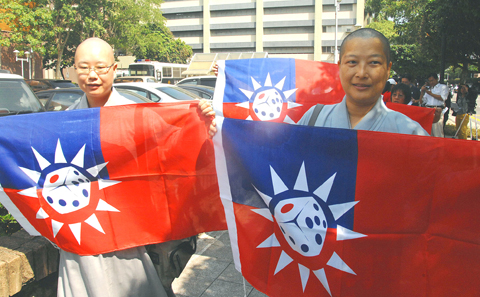Democratic Progressive Party (DPP) Chairperson Tsai Ing-wen (蔡英文) urged the party’s supporters yesterday to vote “no” in the casino referendum scheduled to be held in Penghu on Saturday.
The legislature passed amendments to the Offshore Islands Development Act (離島建設條例) in January that would allow construction of casinos on the islands if more than 50 percent of local residents agree to the plan in a referendum.
“The DPP made it very clear before the casino amendment to the Offshore Islands Development Act was passed in January because the potential threat that large casino resorts will have to Penghu’s ecosystem,” Tsai told a news conference at party headquarters.

PHOTO: PATRICK LIN, AFP
“Now we urge all our supporters to vote ‘no’ in the casino referendum,” she said.
Tourism in Penghu should be developed in a sustainable way by focusing on the island’s rich culture and diverse ecosystem.
“Only large casino resorts, not ordinary Penghu residents, would benefit from the construction of casinos,” Tsai said.
She also voiced concern that if Penghu develops casino-centered tourism, casino groups might eventually control local politics and economy, as shown by what happened in Macau showed.
DPP Legislator Chen Chieh-ju (陳節如) rebutted claims by the Penghu County Government that casinos could bring prosperity to the county by creating 25,000 jobs and attracting 5 million visitors a year.
“If we look closely at Las Vegas, it’s clear that the county government is lying,” Chen said.
Citing figures from last year, Chen said there were 266 casinos in Las Vegas, with more than 22,000 employees and attracting nearly 51.6 million visitors. The net income of the casinos totaled about US$1.1 billion, generating around US$925 million in taxes for the Nevada state government, she said.
“There are 266 casinos in Las Vegas, but Penghu will only have two,” Chen said. “If we calculate the number of visitors based on Las Vegas’ example, Penghu will only have 380,000 visitors per year. Where did the county government get 5 million?”
Even the biggest casino in Las Vegas only has between 8,500 and 9,000 employees, she said, adding: “I don’t see how two casinos would create 25,000 jobs.”
Based on the Las Vegas example, “the county government would only get about NT$900 million [US$27 million] in taxes a year from the two casinos, which means that each of the 95,146 residents could be allocated about NT$946 a year,” Chen said.
Meanwhile, the Anti-gambling Legislation Alliance held a demonstration outside the Ministry of Justice yesterday to protest Minister of Justice Wang Ching-feng’s (王清峰) comment in the legislature last week that a Penghu prosecutor’s remarks against casinos were “inappropriate.”
She was referring to Penghu District Prosecutor Wu Hsun-lung.
The alliance said Wang’s comments, not Wu’s, were inappropriate because they were made before she had carefully evaluated the situation. The alliance brought with them a letter from Wu to the minister, in which the prosecutor said he would rather give up her job than agree to casino resorts in Penghu.
Tsai Rei-tsong (蔡瑞宗), director of the ministry’s Department of Prosecutorial Affairs, accepted the alliance’s petition.
Tsai said the ministry would respect Wu’s right to freedom of speech if Wu was making the comments in his personal capacity. However, if Wu was commenting on the casino issue as a prosecutor, this was something the ministry would frown upon.

Alain Robert, known as the "French Spider-Man," praised Alex Honnold as exceptionally well-prepared after the US climber completed a free solo ascent of Taipei 101 yesterday. Robert said Honnold's ascent of the 508m-tall skyscraper in just more than one-and-a-half hours without using safety ropes or equipment was a remarkable achievement. "This is my life," he said in an interview conducted in French, adding that he liked the feeling of being "on the edge of danger." The 63-year-old Frenchman climbed Taipei 101 using ropes in December 2004, taking about four hours to reach the top. On a one-to-10 scale of difficulty, Robert said Taipei 101

Taiwanese and US defense groups are collaborating to introduce deployable, semi-autonomous manufacturing systems for drones and components in a boost to the nation’s supply chain resilience. Taiwan’s G-Tech Optroelectronics Corp subsidiary GTOC and the US’ Aerkomm Inc on Friday announced an agreement with fellow US-based Firestorm Lab to adopt the latter’s xCell, a technology featuring 3D printers fitted in 6.1m container units. The systems enable aerial platforms and parts to be produced in high volumes from dispersed nodes capable of rapid redeployment, to minimize the risk of enemy strikes and to meet field requirements, they said. Firestorm chief technology officer Ian Muceus said

MORE FALL: An investigation into one of Xi’s key cronies, part of a broader ‘anti-corruption’ drive, indicates that he might have a deep distrust in the military, an expert said China’s latest military purge underscores systemic risks in its shift from collective leadership to sole rule under Chinese President Xi Jinping (習近平), and could disrupt its chain of command and military capabilities, a national security official said yesterday. If decisionmaking within the Chinese Communist Party has become “irrational” under one-man rule, the Taiwan Strait and the regional situation must be approached with extreme caution, given unforeseen risks, they added. The anonymous official made the remarks as China’s Central Military Commission Vice Chairman Zhang Youxia (張又俠) and Joint Staff Department Chief of Staff Liu Zhenli (劉振立) were reportedly being investigated for suspected “serious

American climber Alex Honnold is to attempt a free climb of Taipei 101 today at 9am, with traffic closures around the skyscraper. To accommodate the climb attempt and filming, the Taipei Department of Transportation said traffic controls would be enforced around the Taipei 101 area. If weather conditions delay the climb, the restrictions would be pushed back to tomorrow. Traffic controls would be in place today from 7am to 11am around the Taipei 101 area, the department said. Songzhi Road would be fully closed in both directions between Songlian Road and Xinyi Road Sec 5, it said, adding that bidirectional traffic controls would